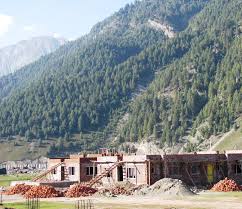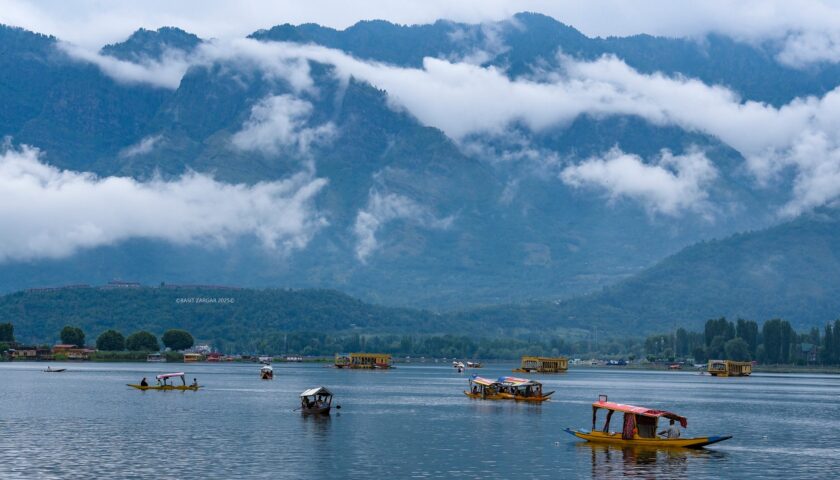One of the significant decisions in the environmental history is the recent climate change encyclical of Pope Francis. The document is now the church’s official position on the environment which includes the practical guidance and is being hailed as a major intervention in the climate change debate. It presents a rare locking of arms between the church and the scientific community.
 The truth that climate change is happening is now an established fact, although there is section which does not agree with it. The day in and day out flood threats and unpredictable weather in the Valley have atleast triggered the common conscience of inhabitants to look out for wrong doings. This has ushered in the popular belief that climate is definitely ‘changing’ in the Valley.
The truth that climate change is happening is now an established fact, although there is section which does not agree with it. The day in and day out flood threats and unpredictable weather in the Valley have atleast triggered the common conscience of inhabitants to look out for wrong doings. This has ushered in the popular belief that climate is definitely ‘changing’ in the Valley.
While ecologists and environmental activists have been flagging the issue of climate change from the day one, little considerable has fructified. People are busy tattering earth and its resources, filling up wetlands and rampantly looting forests. This suggests that flagship programmes of environmentalism are not reaching to masses or to put it conversely people are not paying heed. The scientific facts of changing climate and its detrimental consequences in near future through various manifestations are not being significantly forwarded for common man’s debate and deliberations. The result is a zero change!
Such deaf ear to the repeated calls of scientists and activists makes it utterly essential to seek guidance from our religious scriptures and find faith based messages to promote scientific facts of eco-concern. In a region like Indian Subcontinent people are relatively more religion conscious and faithful to their beliefs. The same goes out with Kashmir where people of all communities are adherent to their religious beliefs and most are actively practicing.
In spite of our religious beliefs there is a void connecting to science mostly because religious scholars do not find it necessary. However, for some time now, it has been the attempt in the other regions of the world to kind of try to de-emphasize the rift between religion, science and public life and to hold inter faith environmental dialogue; the Pope’s encyclical being one such example.
The question here is not whether the encyclical is a game changer. It should instead direct the religious heads of other communities to come up with similar worldwide declarations on environmental concern and its protection.
Islam gives clear cut directions to necessarily protect the earth and promote conservation of natural resources. Holy Quran and Al Hadith are filled with such messages. It is the best way to make people realize our waywardness, which has landed us in complex environmental anomalies.
For instance, in one of the verses of Al-Quran (30:41) Allah says “Corruption has appeared throughout the land and sea by [reason of] what the hands of people have earned so He may let them taste part of [the consequence of] what they have done that perhaps they will return [to righteousness]. According to the verse cited, Allah is giving us a taste of our own medicine so that we may return from the wrong paths we have taken in life. We have caused corruption on land and sea, and it is up to us to mend our ways. This given verse openly speaks about our wrongdoings.
Conservation in Islam is seen as good behaviour, that is how we conduct our affairs and manage our surroundings “Let there be a community among you who call to the good, and enjoin the right and forbid the wrong. They are the ones who have success (3:104).”
Is it not the responsibility of our religious heads to stand and take a lead to spread such messages to promote environmental conservation? They have to begin to make this issue one of the central themes of teaching in the light of religious scriptures, which are replete with such messages.
A network of all prominent heads of Jamia Masjids and Markaz across the Valley should be developed where such matters would be discussed. Books and pamphlets of environmental messages from Quran and Hadith should be published in huge numbers. It should have broader outreach to remotest of the remotest villages so that a pan-Kashmir movement of environmentalism begins. During Jumakhutba, a mere five minutes of such messages will help to bring to notice of wider section. Darululooms should actively be involved so that our brilliant future religious scholars become instrumental in educating common masses through their sermons, lectures and writings.
Similarly religious heads and scholars of other communities should start looking back to scriptures and spread the message on similar lines. On a broader platform, the heads of all the communities in Valley should issue joint declarations and hold public meetings and seminars. The print media and local TV channels should find it as a major responsibility to cover such deliberations and spread the environmental concern.
Religious awareness and guidance in this field is necessary so that each individual may take part in the protection and development of the environment and natural resources. Much environmental degradation is due to people’s ignorance of what their Creator requires of them. People should be made to realize that the conservation of the environment is a religious duty demanded by Almighty. As an exemplar Allah says “It is He who appointed you viceroy on earth” (6:165). Humans have been chosen as guardians and protectors. We are thus bound to protect the natural resources not to destroy it.
There is no other way than such an outreach programme to take environmental messages in each and every home of Valley. How great it would be (hopefully) if our religious scholars and we start it from today to stand for and vow of environmental protection; and to the effect that other parts of the world emulate from Kashmir to make it a global trend of new conservationism.
(The writer can be reached at: mirfaizananwar@gmail.com)
Protection of Environment in Kashmir




